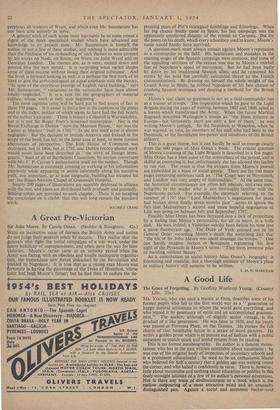A Great Pre-Victorian
Sir John Moore. By Carola Oman. (Hodder & Stoughton. 42s.) WITH an instinctive sense of fairness the British Artily and nation o not judge their generals solely by success. They realise that the nerals who fight the initial campaigns of'a war work under the heavy handicap of unpreparedness, and often pave the way for later victories. Moore's career came at an unlucky period when the Army was facing, with an obsolete and totally inadequate organisa- ion, the tremendous new forces unleashed by the Revolution and yielded by Napoleon. It is true that as a young man Moore was fortunate in having the patronage of .the Duke of Hamilton, whose tutor had boob Moore's father; but he had then to endure the de-
pressing years of Pitt's strategical fumblings and fritterings. When his big chance finally came in Spain, his last campaign was the apparently unrelieved disaster of the retreat to Corunna. But for the poem on his death, which every schoolboy used to know, Moore's name would hardly have survived.
A question-mark must always remain against Moore's reputation as a commander in the field. His hesitations and mistakes in the opening stages of the Spanish campaign were ominous, and some of the appalling attrition of the retreat was due to Moore's morbid fear of Napoleon's speed of movement. But he had been badly let down by his maddening Spanish allies, and he redeemed his errors by his bold but carefully calculated threat to the French communications. By drawing on himself the whole weight of the Grand Army in Spain, he robbed Napoleon of his best chance of crushing Spanish resistance and denying a foothold for the British army.
Moore's real claim to greatness is not as a field-commander but as a trainer of troops. The inspiration which he gave to the Light Brigade during the years of waiting, between 1803 and 1806, acted as a leaven which transformed the Army. When the future Marshal Bugeaud described Wellington's troops as "the finest infantry in Europe—but fortunately there are only a few of them," he was writing Moore's epitaph. So did Napoleon at Waterloo, when he was warned, in vain, by members of his staff who had been in the Peninsula, of the formidable fire-power and steadiness of the British infantry.
This is a great theme, but it can hardly be said to emerge clearly from the 600 pages of Miss Oman's book. The crucial question of Moore's training of the Light Brigade is described in a few pages. Miss Oman has a keen sense of the atmosphere of the period, and is skilful at conveying it, but unfortunately she has allowed this facility to run riot. The result is that the extracts from Moore's journal are embedded in a mass of social gossip. There are far too many pages containing sentences such as "The Court was at Weymouth, and London was very empty of fashionables." At the same time, the historical circumstances are often left obscure, and even unin- telligible, to the reader who is not thoroughly familiar with the Napoleonic period. For example, the statement referring to the summer of 1797 that "Lord Malmesbury's negotiation for peace had broken down finally seven months past" seems to ignore the fact that Malmesbury's second and more hopeful negotiation at Lille was going on between July and September, 1797.
Possibly Miss Oman has been betrayed into a lack of proportion by a feeling that Moore's personality, for all its merit, is a trifle dull. He was, indeed, a Victorian worthy born before his time into a more flamboyant age. The Duke of York pointed out in his General Order recording Moore's death the surprising fact that "the life of Sir John Moore was spent amongst the troops." One can hardly imagine Nelson or Bonaparte registering his first sight of the Pyramids in Moore's terms: "They form immense piles of building without beauty."
As a contribution to social history Miss Oman's biography is interesting and readable, but a thorough estimate of Moore's place in military history still remains to be written.
F. M. H. MARKHAM










































 Previous page
Previous page